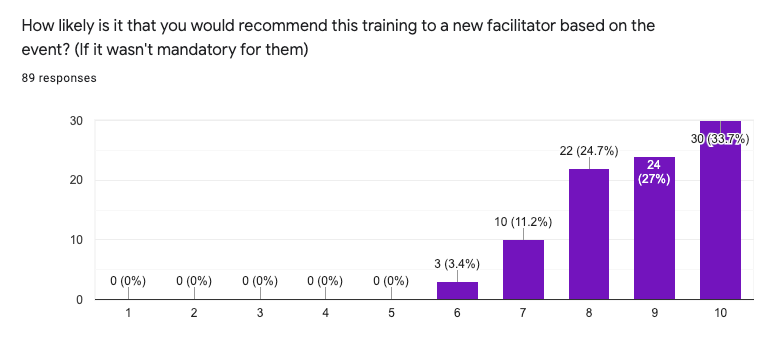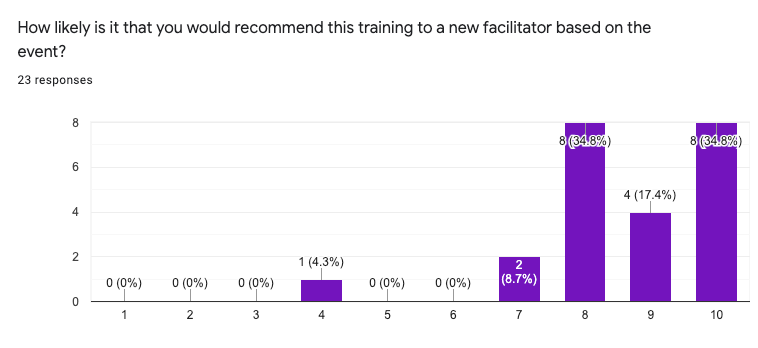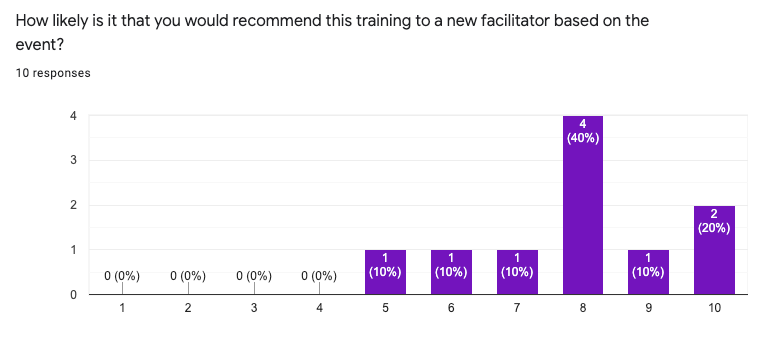Group Discussion Facilitator Training Guide
By Jessica McCurdy🔸 @ 2021-01-24T17:19 (+50)
Group Discussion Facilitator Training Guide
I recently put together a training for the ~100 facilitators of EA Virtual Programs (Intro Fellowship, In-Depth Fellowship, and Precipice Reading Group). I aimed to make the training broad enough to be generalizable to other programs so that I could share it afterwards as a resource for organizers who might want to run similar trainings. In this post I will cover our rationale for the training, the feedback we received, and all of the resources used so that it can be run by other organizers. I hope it proves helpful and I am looking forward to hearing feedback!
Acknowledgements
I received a lot of help putting this together. I want to thank Will Payne and Catherine Low for first proposing that this training be run, Emma Abele and Aimee Watts for their feedback and ideas, and Kuhan Jeyapragasan for his feedback and for creating the resources for the session on talking about EA. I also want to thank Will Payne, Eve McCormick, Thomas Woodside, and Eui Young Kim for helping me record the training videos for our session on moderator moves.
Rationale and Guiding Thoughts
We think the facilitator of a group has a really big role in how valuable a discussion ends up being and that this is something that one has to learn how to do effectively. In the past, one bottleneck for running big fellowship programs and discussion groups has been not having enough skilled moderators. We hoped by creating a training program we could reduce this bottleneck by quickly skilling up new facilitators.
Our training was based on the premise that some things (such as tips and tricks) can be written down and some things (such as how to swiftly and carefully facilitate discussions) are best to be practiced with others. Given this premise, we collated written resources in an information document* and ran several zoom training sessions with a focus on practicing and discussing the most important information we wanted facilitators to be aware of.
*Most of this info is in this post but if you would like to see the original document we sent out to facilitators you can email me at jessica.mccurdy@yale.edu
Written Resources
We collected these tips and tricks based on the most common problems and solutions noted in a survey of experienced facilitators.
10 Facilitation Tips and Tricks
- The same people are always talking? Ask if anyone who hasn't gotten a chance to speak as much would like to add anything.
- Slower conversation? Share discussion content ahead of time so people can think ahead about what they would like to say.
- Jargon gets used? Ask the person who used it to define it
- Everyone in agreement? Ask explicitly if anyone disagrees or can think of a reason one might disagree.
- Off on a tangent? Ask if we can put a pin in this and come back to it after the discussion so that we have time to cover all of this week's points.
- Quiet group? Ask people a question round robin (go around and have everyone answer)
- Silences? Be okay with them. Sometimes it takes people a while to speak up.
- One person keeps interrupting? Ask the group as a whole if we could be cautious about letting people finish.
- One person never talks? Watch their facial expressions for cues that they might want to say something and ask them directly if they have something to add.
- One person continues to talk too much. Have a chat with them after the discussion thanking them for their contributions but gently explain that you would like to get to hear from everyone.
Other Resources for Facilitators
- EA Hub Facilitator Tips: From the EA Hub guide on running discussion groups
- Tips for talking about common questions/misconceptions/criticisms about EA
- Suggestions for Monitoring Discussions by Anne le Roux: This helpful guide contains common problems and solutions and focuses on facilitating virtual discussions
- Fellowship Facilitator Tips by Joshua Monrad: These tips come from an experienced EA discussion facilitator
Virtual Training Sessions Resources
Mandatory Training
- This training covered information we thought was the most important for our facilitators to know and allowed facilitators to practice moderating during situations that commonly challenge facilitators. We covered some information in the presentation that was also in our documentation sent out because we were worried not everyone would read it thoroughly.
- Half of the time was spent in breakout rooms on a role-playing exercise where participants took turns moderating discussions while the other participants in the room acted as specific types of people that sometimes appear in discussions. In our feedback this was the section that was overwhelmingly cited as the most valuable.
- Recording of the presentation part of the mandatory training
- The slides with speaker notes from the mandatory training
- Instructions and guide to the role-playing exercise
Optional Training 1: Facilitating EA Content, Addressing Concerns, and Common Misconceptions to Avoid (highly recommended for intro fellowship facilitators):
- This training covered common misconceptions that people new to EA have and lessons learned from group organizers on how to reply to common questions and concerns. We included time to try out these best practices and brainstorm new ones.
- At the start of the session we had participants upvote the 5 misconceptions and critiques in the document that they had heard the most frequently.
- We then broke out into groups where one person would act as a participant posing the question or critique and the other participants had to respond.
- Collaborative document of questions, misconceptions and replies as well as instructions for the breakout rooms. (This document is still being updated and there may be a post on it later)
Optional Training 3: Moderator Moves - Discussing Examples and Additional Practice:
- During this session, in breakout rooms, we reviewed four 2-minute videos that were created to show potential ways to handle common situations during discussions. Participants took turns moderating meta-discussions about the videos where they talked about what was done well and what could have been improved on. One person was assigned to take notes in the collaborative document
Feedback
Mandatory Training

How could the training be improved? (70 responses)
- Longer time doing the role playing (10)
- Shorter presentation (4)
- In the first round we spend 5 minutes in mock discussion and 3 minutes in meta-discussion, after feedback that this was too short in meta discussion (4) we switched to 4-4 in the second round and did not receive this critique
- Several people asked for a write up similar to what was in the information document which was sent out to them (4) suggesting that they did not read it/ we did not do a good enough job explaining what it is and motivating people to read it
- Some participants wanted more guidance in the scripts either explaining the jargon or giving more samples of what to say. They said the level of the discussion topics was a bit high for improv. (4)
What was the most valuable part of the training? (82 responses)
- The role play exercise with meta discussions (80)
- The presentation section on common pitfalls (2)
What was the least valuable part of the training? (56 responses)
- N/A or All was valuable (18)
- Talk on EA and other movements (13)
- The presentation not being interactive/ being too obvious/ repeating info from doc (7)
- Breakout rooms by program (4)
- 5 minute break (3)
My notes for the future:
- Make the presentation a bit shorter
- Keep the 4-4 timing on the practice rounds
- Emphasize more clearly that sample responses can be found on the information document
- Emphasize more clearly that discussions can be much shorter than 5 minutes and that people do not have to stay strictly on script
- Give a few more examples of what people could say in the mock discussion scripts
- Make the presentation more interactive
- I wouldn’t remove the repetitive content in the presentation because I am worried many people won’t read the document sent
Optional Training 1: Facilitating EA Content, Addressing Concerns, and Common Misconceptions to Avoid (highly recommended for intro fellowship facilitators):

How could the training be improved? (18 responses)
- Having a meta-moderator (3)
- More structure (3)
- More guidance on playing the devil's advocate role (2)
- Shorter rounds / more breakout rooms (2)
- Group criticisms by topic (2)
What was the most valuable part of the training? (20 responses)
- The discussions (9)
- The document (8)
- Just meeting other facilitators and talking (2)
What was the least valuable part of the training? (9 responses)
- N/a all valuable (3)
- Discussions running long (2)
My notes for the future
- Perhaps only have one breakout session where groups go over whichever questions they want and however many they want
- Assign meta-moderators is possible
- Add more instruction for what to do in breakout sessions including more resources on being a devil’s advocate
Optional Training 3: Moderator Moves - Discussing Examples and Additional Practice:

How could the training be improved? (4 responses)
- Have better actors/ more realistic discussions (2)
- More time for discussion (1)
- Analyze a video about a sensitive issue coming up (1)
What was the most valuable part of the training? (6 responses)
- Analyzing the videos (3)
- Feeling more connected to other facilitators (1)
What was the least valuable part of the training? (4 responses)
- N/a all valuable (4)
My notes for the future
- Maybe add a video discussing a sensitive topic
- If possible pull clips from real conversations (we were going to do this but wanted to make this shareable and thus wanted to avoid privacy issues)
BrianTan @ 2021-02-07T03:57 (+3)
Thank you so much for these resources! I particularly liked the training videos. I think your acting was great in them Jessica!
I'll share these with facilitators for our 2 upcoming virtual fellowships here in the Philippines. We will likely try to hold 1 training session using some of the content above too :)